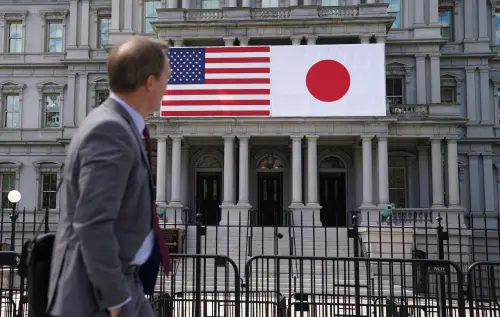The euphoria in South Korea surrounding the inter-Korean summit is understandable since it was the first meeting ever between the two heads of that divided country. It is to be hoped the euphoria will subside so the real task of evaluating what has and has not changed on the Korean peninsula can begin.
Summit euphoria’s immediate effect on South Korea has been striking. According to public opinion polls, almost all South Koreans judged the summit a success and President Kim Dae-Jing’s approval rating jumped from 46 percent to 71 percent. More than half the South Koreans polled thought unification would take place in the next decade and more than three-quarters favored either a step-by-step or total withdrawal of U.S. troops. About 73 percent anticipated that North Korean society would now begin to change and 97 percent changed their opinion about North Korean Chairman Kim Jong-Il to a more positive one.
The “political bounce” for South Korean President Kim has propelled support for South-North discussions to new heights. Three quarters of the South Korean people are now willing to accept a tax increase for financial support of government projects in North Korea.
But, while that support is broad, it may not be deep. For example, the price tag for assistance to North Korea could run into the hundreds of millions if not billions of dollars. Support might also be undermined by incidents such as past incursions of North Korean submarines that have proved all too common on the peninsula.
The backlash in the South could be much worse given the great expectations created by the summit. At the same time, the summit euphoria threatens to unleash strong nationalist feelings directed at the U.S. troop presence.
South Korea has already been experiencing a wave of subtle nationalism aimed at the American military presence. The controversy over the South Korean civilian deaths at the hands of American soldiers during the Korean War, widespread concerns that the agreement governing U.S. forces in Korea is inequitable and police clashes with protesters near a U.S. bombing range only add fuel to the fire. Once again, the depth of these feelings should not be exaggerated, but President Kim will actively have to manage them.
As for Kim Jong-Il, he is still the same person he was a few months ago.
Through summit diplomacy, Kim has transformed his image from a shadowy figure fascinated by terrorist plots and Scandinavian blondes to a skillful leader. In fact, Kim Jong-Il has always been ready to do whatever is necessary to preserve the political system he inherited from his father and his family rule. He was in training for more than 20 years and was running the country while his father still lived. Chairman Kim remains someone who, one minute, can withdraw from the Nuclear Non-Proliferation Treaty, creating a global crisis?as he did in 1993?and the next minute can act the ingratiating host to his elder South Korean counterpart. Richard Nixon?who said a good leader is unpredictable?would be proud.
There is also no evidence that North Korea is “changing.” Its use of diplomacy to engage the international community is reminiscent of efforts in the early 1990s leading to agreements with South Korea that were never implemented and a dialogue with Japan to normalize relations that never made progress. Moreover, there is no evidence yet that the North’s domestic system is about to change or that its military threat is diminishing. Recent events may be the beginning of real change, but an outpouring of external assistance could also undermine the cause of internal advocates of real change by taking the pressure off Pyongyang.
Placing all these developments in the proper perspective will be critical for the United States, South Korea and also Japan. Just as President Kim lowered public expectations before the summit meeting, he must now lower expectations for what comes next. After all, the summit’s main accomplishments?initial reunions of 100 Korean families and the resumption of government-to-government contacts?pale in comparison to the remaining political, economic and security issues left over from the past 50 years of Cold War confrontation. Deliberately lowering expectations may diminish public support for his policy but at the same time, it would bring those expectations into line with what will prove to be a difficult road ahead.
As for the United States, Secretary of State Madeleine Albright’s visit to Seoul last week and her meetings with President Kim are a good start in placing the summit in a common perspective. Even if expectations prove exaggerated, we must recognize that the summit could be the beginning of a process of change on the peninsula.
If it is, Washington will have to adjust its approach. First, even closer coordination between the United States, Japan and South Korea will be needed to deal with tough issues such as dismantling the Cold War confrontation on the peninsula. Second, we must design a policy that tests Pyongyang and avoids the worst of both worlds?a North Korea reinvigorated by outside economic assistance that, at the same time, is reinvigorating its military machine.
Finally, the United States must play an active, positive and tangible role in any process of reconciliation between North and South. Under the right conditions, that may require providing economic assistance for reconciliation between the two Koreas.
Wit was a State Department official dealing with North Korea from 1993 to 1999.


Commentary
Op-edRapid Korean Changes Are Unlikely
June 28, 2000